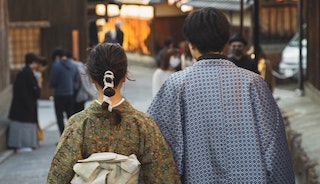May 25 (News On Japan) - More people in Japan are using online chats today than ever before. These are not just quick messages sent to friends. They are longer, kinder conversations. Many users say they feel more relaxed, more open, and less lonely during these chats.
This change is happening across all age groups. It's not only students or young professionals. Parents, retirees, and even people in their eighties are finding comfort in these online spaces. What used to feel cold and distant now feels warm and close.
The reasons behind this shift are many. It helps to look at the pressures of daily life, the cultural habits of Japanese society, and how new tools are changing what it means to talk with others.
The Pressure to Stay Silent
Speaking Up Can Be Hard
Japan values harmony. Most people are taught from a young age to avoid conflict, speak quietly, and keep emotions to themselves. This means that even when someone feels sad or upset, they often don’t say anything.
In daily life, it can feel rude to speak up. People try not to bother others with their problems. This can lead to stress building up inside. Some feel like they don’t have anyone to talk to, even in their own homes.
The Fear of Judgment
In a society that often rewards silence and patience, it’s easy to fear being judged for saying something too personal. Many people worry that others will think less of them if they admit to being lonely, anxious, or simply unhappy.
That’s where online chats help. A screen gives people space. When typing, there’s no need to keep a brave face. It feels safer to open up when no one is watching.
The Rise of Loneliness
Urban Life Without Connection
In big cities like Tokyo and Osaka, people live close to each other but rarely talk. Trains are full, streets are busy, yet many feel completely alone. Most conversations are short and formal, often just about work or tasks.
After long hours at the office, many come home to small, quiet apartments. Some live alone and may go days without real conversation. Online chats become the only way to connect with another person.
Older Adults Left Behind
Japan has one of the oldest populations in the world. Many seniors live without family nearby. After a spouse passes away or children move far away, silence fills their homes.
Friendly adult chat platforms now give them the opportunity to chat face-to-face with other adults. They may share memories, ask questions, or simply say good morning to someone who replies kindly.
The Technology Making It Possible
Simple Apps, Big Impact
Most people in Japan use smartphones every day. Apps like LINE are part of everyday life. These tools are easy to use and free. People can send a message with one tap.
Many apps now include options for voice notes or video, but text chat remains the most popular. It’s quiet, can be done anywhere, and gives users time to think before replying.
Anonymous Chat Rooms
Some services offer complete privacy. Users can chat without sharing their name, age, or face. This makes it easier to talk about difficult topics. They can share their worries without anyone knowing who they are.
Some even say they feel more like themselves online than in real life. They aren’t trying to please anyone or meet expectations. They are just being honest.
A Safe Way to Talk About Feelings
Less Shame, More Sharing
Mental health is still a sensitive topic in Japan. Many do not seek help even when they suffer. Shame and fear hold them back. Friendly online chats offer a soft first step.
It feels less serious than therapy. There is no appointment, no office, and no waiting room. Just a simple message sent to someone who will listen and respond with kindness.
Talking Without Labels
There are chat services with trained listeners who are not doctors but who understand how to talk gently. Users often say they feel lighter after a chat, even if the conversation was short.
This doesn’t replace professional care, but for many, it helps them find the courage to speak about things they’ve kept hidden for years.
Who’s Using These Chats?
Teens and Young Adults
Students often feel pressure from exams, parents, and social groups. They may have many friends on the surface, but few they can trust deeply. Online chats give them a space to be honest without fear of embarrassment.
They talk about school, love, worries about the future, or even just the stress of getting up each day.
Middle-Aged and Working People
Adults in their 30s to 50s often carry big responsibilities. Work, family, money, and aging parents all weigh on them. Yet they may have no time or energy to build real friendships.
Online chats allow them to connect without needing to plan a meetup. They can talk during a train ride, lunch break, or before bed.
Retired and Elderly
For many older adults, the hardest part of aging is not health but loneliness. After retirement, they lose daily contact with co-workers. Some may not have anyone to talk to regularly.
Now, more seniors are learning to use simple apps with the help of family or community programs. These chats brighten their day and make them feel heard.
Why These Chats Feel Different
No Need to Pretend
In daily life, many people wear a mask. They act cheerful even when they are not. Online chats allow them to drop that act. They can type how they really feel without worrying what others will think.
That honesty can be powerful. Some say they finally feel seen. Others say they laugh more in these chats than they do during face-to-face talks.
One Message Can Change a Day
Small messages matter. A kind reply, a shared story, or even just a good-night text can lift someone’s mood. It reminds them that someone is out there, thinking of them.
These moments help people feel less invisible. And when someone replies with care, it creates a tiny but real bond.
Quiet Moments That Count
Japan is known for being polite and calm. But underneath, many people long for real connection. Friendly online chats are filling that space. Not with noise or big speeches, but with small, honest messages.
These chats may not replace deep friendships or family ties, but they bring comfort. They help people breathe a little easier. They make it okay to speak up, even if it’s just a few words at a time.
In a place where silence is often chosen, a quiet chat can mean more than we think.















